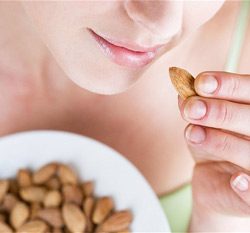A new study from Canadian researchers at the University of Alberta and University of Manitoba is shedding new light on changes in intestinal bacteria of infants that can predict future development of food allergies or asthma. The research, published in the February edition of the journal Clinical & Experimental Allergy and highlighted as the publication's "Editor's … [Read more...]
Nutrition & Wellness News

Gender differences play key role in supporting healthy diets for seniors
Strategies to support healthier diets among seniors need to take into account differences between elderly men and women, according to UBC research. The two groups had varying responses to a tactic thought to boost seniors' fruit and vegetable intake, according to a study published in Appetite. The study explored which types of social support encouraged seniors to boost … [Read more...]
Plastic processed food containers linked to risk of high blood pressure and diabetes
According to a new series of studies out of NYU Langone Medical Center, two chemicals increasingly used during manufacturing to strengthen plastic wrap, soap, cosmetics, and processed food containers have been linked to a rise in risk of high blood pressure and diabetes in children and adolescents. The compounds, di-isononyl phthalate (DINP) and di-isodecyl phthalate (DIDP), … [Read more...]
Grave consequences of meat consumption: A Study
High consumption of livestock products could have serious consequences for people and the environment, according to a recent article published in Environment: Science and Policy for Sustainable Development. The article, titled "The Sustainability Challenges of our Meat and Dairy Diets," emphasizes that the demand for livestock-based foods has soared over the last few decades. … [Read more...]
Kids’ brain responses to food depend on their body composition: A Study
Research using brain imaging technology has revealed a brain response pattern in children that might represent a step along the path to childhood obesity. The study, conducted by Nicole Fearnbach, a graduate student in Penn State University's Department of Nutritional Sciences, scanned children's brain activity while they viewed pictures of high- and low-calorie foods, and … [Read more...]
Nut consumption associated with reduced risk of some types of cancer: A Study
Cancer and type 2 diabetes are two of the most significant public health burdens facing the world today, and currently available data suggests their prevalence is expected to continue to increase. Nut consumption has long been hypothesized to have a role in preventing both of these diseases, but until now evidence has been inconsistent. A new systematic review and meta-analysis … [Read more...]
New Zealand blackcurrants good for the brain: A Study
Research has shown that New Zealand blackcurrants are good for keeping us mentally young and agile, a finding that could have potential in managing the mental decline associated with aging populations, or helping people with brain disorders such as Parkinson's disease or depression. The research, conducted by scientists at Plant & Food Research (New Zealand) in … [Read more...]
‘Fitness’ foods may cause consumers to eat more, exercise less: A Study
Weight-conscious consumers are often drawn to foods such as Clif Bars and Wheaties, whose packaging suggests that they promote fitness. But according to a new study in the Journal of Marketing Research, such "fitness branding" encourages consumers to eat more of those foods and to exercise less, potentially undermining their efforts to lose or control their weight. "Unless a … [Read more...]
Digesting bread and pasta can release biologically active molecules: A Study
Biologically active molecules released by digesting bread and pasta can survive digestion and potentially pass through the gut lining, suggests new research. The study, published in the journal of Food Research International, reveals the molecules released when real samples of bread and pasta are digested, providing new information for research into gluten sensitivity. The … [Read more...]
High-fat diet may alleviate mitochondrial disease: A Study
Mice that have a genetic version of mitochondrial disease can easily be mistaken for much older animals by the time they are nine months old: they have thinning grey hair, osteoporosis, poor hearing, infertility, heart problems and have lost weight. Despite having this disease at birth, these mice have a "secret weapon" in their youth that staves off signs of aging for a … [Read more...]
Alcohol consumption among women linked to increased caloric intake: An Obesity Society Study
The first study of its kind measuring the brain's role in mediating caloric intake following alcohol consumption among women shows that alcohol exposure sensitizes the brain's response to food aromas and increases caloric intake. The research, led by William J. A. Eiler II, PhD, of the Indiana University School of Medicine's Departments of Medicine and Neurology, adds to the … [Read more...]
An Avocado A Day!
You’ve heard the old saying “an apple a day keeps the doctor away” but how about an avocado a day? Research shows that the “good fat” absorbed from eating avocado can help lower your bad cholesterol and increase your heart health. Whether you like them or hate them, research shows that eating a whole avocado a day can actually decrease bad cholesterol by thirteen … [Read more...]
Simply having a vegetable on the plate made the whole meal be perceived as tastier: A Study
A study has confirmed that simply having a vegetable on the plate made the whole meal perceived as tastier. Do you want to be seen as a better cook and a more loving parent? It's as easy as serving a vegetable at dinner, according to recent research. Families are most likely to consume vegetables at dinner time, yet only about 23% of dinners contain a full serving of … [Read more...]
Forthcoming 2015 Dietary Guidelines for Americans: Researchers call to reduce restrictions on total fat consumption
Researchers have called to reduce restrictions on total fat consumption in the forthcoming 2015 Dietary Guidelines for Americans. In a Viewpoint published in the Journal of the Medical Association (JAMA), researchers from the Friedman School of Nutrition Science & Policy at Tufts University and Boston Children's Hospital call on the federal government to drop restrictions … [Read more...]
Packaging makes primary school children take Healthy Foods: A German Study
A study has confirmed that packaging makes primary school children take healthy foods. If the packaging has an appealing design, primary school children also reach for healthy foods. This was revealed in a study in cooperation with the Research Institute for Child Nutrition in Dortmund under the direction of scientists from the University of Bonn. The results are being … [Read more...]
Designer Fiber: Getting Rid of Tummy Troubles?
You’ve been told forever that fiber is good for your gut, and it's a good way to treat irritable bowel syndrome, or IBS. The downside is fiber causes bloating. New research could end that side effect and create a break-through treatment for other serious health problems.Submit Shannon McKinney has always been active, and tries to watch her diet. But for years, her “tummy … [Read more...]
Berries, Grapes convert excess white fat into calorie-burning “beige” fat: A Washington State University Study
A study has established that berries and grapes convert excess white fat into calorie-burning "beige" fat. Washington State University scientists have shown that berries, grapes and other fruits convert excess white fat into calorie-burning "beige" fat, providing new strategies for the prevention and treatment of obesity. In the study, mice were fed a high fat diet. Those … [Read more...]
Too much dietary zinc linked to copper deficiency and neurological problems: A Study
A study has proved that taking too much dietary zinc is linked to copper deficiency and neurological problems. Doctors often misdiagnose zinc deficiency, and seem to be unaware of the impact of excess zinc on the body, shows a small audit of clinical practice, published online in the Journal of Clinical Pathology. Too much zinc, taken in the form of dietary supplements, may … [Read more...]
Dietary trans fatty acids linked to worsened memory: A Study
A study has inferred that dietary trans fatty acids are linked to worsening of memory. Higher consumption of dietary trans fatty acids (dTFA), commonly used in processed foods to improve taste, texture and durability, has been linked to worsened memory function in men 45 years old and younger, according to a University of California, San Diego School of Medicine study published … [Read more...]
Adopting a diet that has the effects of fasting has great health benefits: A Study
A study has proved that adopting a diet that has the effects of fasting does have great health benefits. Want to lose abdominal fat, get smarter and live longer? New research led by USC's Valter Longo shows that periodically adopting a diet that mimics the effects of fasting may yield a wide range of health benefits. In a new study, Longo and his colleagues show that cycles … [Read more...]
Nuts and peanuts linked to lower mortality rates: A Study
A study has concluded that nuts and peanuts are linked to lower mortality rates. A paper published in the International Journal of Epidemiology confirms a link between peanut and nut intake and lower mortality rates, but finds no protective effect for peanut butter. Men and women who eat at least 10 grams of nuts or peanuts per day have a lower risk of dying from several major … [Read more...]
To Vegan Or Not To Vegan
Studies show more than 7 million Americans are vegetarians. Veganism is one of the strictest forms of plant-based dieting, but is it right for you? No meat, no fish, no dairy, no eggs, no honey! Could you be a vegan? Clinical Dietician at the University of Washington, Judy Simon, MS, RD, CD, CHES, says a vegan diet can be healthy, but not always. Some vegans dont eat … [Read more...]
Harmful effects of dietary supplementation in children with Autism Spectrum Disorder: A Study
A study has inferred that dietary supplementation in children with Autism Spectrum Disorder is harmful. Children with Autism Spectrum Disorder (ASD) are often picky eaters, which can lead parents to suspect that their children might not be getting adequate amounts of vitamins and minerals. This sometimes leads parents of children with ASD to try nutritional supplements and … [Read more...]
‘Do’ is better than ‘don’t’ when it comes to eating better: A Study
A study has established that 'Do' is better than 'don't' when it comes to eating better. Tell your child or spouse what they can eat and not what they can't. Telling your child to eat an apple so they stay healthy will work better than telling them not to eat the cookie because it will make them fat. A new Cornell discovery shows that "Don't" messages don't work for most of … [Read more...]
Thoughts drive dieting plans but feelings drive dieting behavior: A Study
A study has concluded that thoughts drive dieting plans but feelings drive dieting behavior. A majority of American adults say they've tried dieting to lose weight at some point in their lives, and at any given time, about one-third of the adult population say they're currently dieting. Yet 60 percent of American adults are clinically overweight or obese and more than 16 … [Read more...]
Measuring arm circumference is a reliable indicator of malnutrition: A Study
A study has proved that by measuring arm circumference it is a reliable indicator of malnutrition. Adam C. Levine, M.D., an emergency medicine physician at Rhode Island Hospital found that the World Health Organization's current weight-based guidelines for assessing malnutrition in children with diarrhea are not as reliable as measuring the child's upper arm circumference. His … [Read more...]
Afternoon snacking of high-protein-soy foods, Reduces afternoon appetite: A Study
A study has concluded that afternoon snacking of high-protein-soy foods leads to reduction of afternoon appetite. Although eating high-protein, afternoon snacks can aid appetite control in adults, little information exists to guide parents on what types of snacks might benefit their adolescent children. Now, MU researchers have found that afternoon snacking, particularly on … [Read more...]
Balancing protein intake throughout the day can be beneficial: A Study
A study has concluded that balancing protein intake throughout the day can be beneficial for your health. Research has shown that eating more protein can support weight loss and prevent weight gain by boosting metabolism, increasing feelings of fullness and helping the body retain muscle while losing fat. However, many Americans are not consuming enough protein in a balanced … [Read more...]
Drinking chamomile decreases risk of death in older Mexican American women: A Study
A study has inferred that drinking chamomile decreases risk of death in older Mexican American women. Researchers from The University of Texas Medical Branch at Galveston have found that drinking chamomile tea was associated with a decreased risk of death from all causes in Mexican-American American women over 65. The findings were recently published online in The … [Read more...]
Healthy Sweet Treats? A Guilt-Free Recipe
We love the way it tastes, but its not so good for our waists. Were talking dessert. The sweet, gooey, goodness puts a smile on our lips but sits forever on our hips. But could there be a healthier way? Cakes. Pies. Cookies. Ice cream. It tastes so good, but can it be healthy? I think that sounds like an oxymoron right, registered dietician Susan Mitchell, PhD, RDN, … [Read more...]
- « Previous Page
- 1
- …
- 14
- 15
- 16
- 17
- 18
- …
- 43
- Next Page »





























